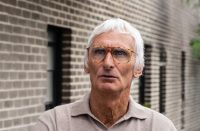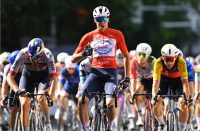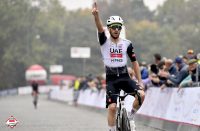Taylor Phinney (Boulder, CO/BMC Racing) finished fourth in Saturday’s 250-kilometer Olympic road race around London. With the dramatic backdrop of Buckingham Palace, Phinney just missed in the bunch sprint for the bronze finishing just off the wheel of Norway’s Kristoff Alexander, who finished third. Alexander Vinokurov (KAZ) took the win and Rigoberto Uran (Colombia) silver just over a minute earlier after slipping off the front in the race’s final kilometers.
“Pretty amazing to have the white jersey at the Tour de France give up his ride for you, so it’s the least I could do to get fourth,” said Phinney just after the finish. “Alexander Kristoff, I’ve never beaten him in a sprint before. He’s a true sprinter and I wouldn’t necessarily call myself that. I was beaten by a better man. It’s too bad those two guys got off the front, but they deserve it if they could get away and Kristoff deserves the bronze.”
Timmy Duggan (Boulder, CO/Liquigas-Cannondale) went off the front from the gun driving a lead group of 12 riders to a gap of nearly five minutes. The favored British were then forced to drive hard on the flats and down hills to try and bring back moves out of the peloton.
“It’s epic to see a team so well bonded when everybody knows that they can win,” explained team captain Chris Horner who suffered from mechanical difficulty. “There’s no doubt Tejay van Garderen can win. There’s no doubt I can win under the right circumstances. There’s no doubt Tyler Farrar can win. You saw a fabulous U.S. team today.”
A chase group including Phinney and Tejay van Garderen was able to break away from the peloton on the fourth of nine laps around the 15.5-km Box Hill circuit. With most other major teams represented in the breaks, the British essentially began riding a team time trial; reeling everyone in before the final time around Box Hill.
With the peloton keen to avoid a sprint to the finish with British strongman Mark Cavendish, the race became increasingly animated on the final lap. With 32-kilometers left, van Garderen, Phinney and Duggan (who was in the thick of the action all day) made a statement, driving the race. Phinney soon made a strong break group and van Garderen, along with the Spanish, were able to drive the race back through the packed streets of London.
“The inside of my legs started cramping in laps eight and nine,” explained Phinney. “I really felt terribly in the last 40 kilometers. As we got closer to the finish, the crowds were so loud and Tejay had been doing such a good job, it kinda hit me that this is the Olympics and I’m going for a medal right now and this isn’t going to happen again – at least not in the near future.”
Within 20-km of the finish, Fabian Cancellara went down on a turn in the twisty city streets, allowing Vinokurov and Uran to slip away.
“It was a wall of sound,” said Phinney of the more than a million fans lining the course. “It definitely helped bring me home.”
The course stretched 55-kilometers out to the Box Hill climb, 15.5-kilometers around the circuit nine times.
“The riders came prepared to execute today and the race played out like we thought it would,” explained USA Cycling VP of Athletics Jim Miller. “When we selected this team we had a tactic in mind for this course and all day long everyone rode a great race. Timmy got in the break right away; that was our first goal. Then when we got onto the circuits we had Tejay and Taylor covering who was going up Box Hill the entire nine laps. We had Horner with us, but he had a lot of mechanicals and was coming in and out of the group the entire time. His leadership was key and I think he provided the confidence we needed.”
Phinney’s fourth-place result equals the second-best finish ever by an American male in the Olympic road race. Frankie Andreu placed fourth in the 1996 race in Atlanta, Robert Mionske fourth in Seoul in 1988. Alexi Grewal won gold in Los Angeles in 1984, while Taylor Phinney’s father, Davis Phinney, was fifth. Carl Schutte also finished third in Stockholm in 1912.




